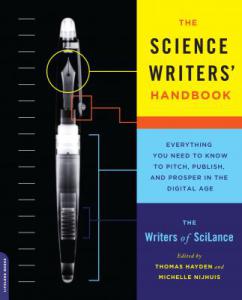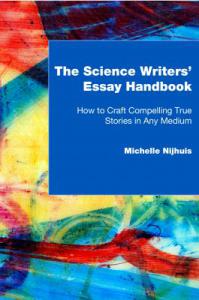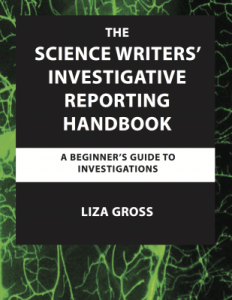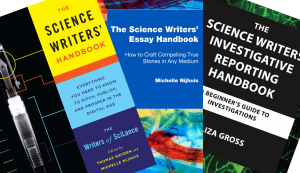The Science Writers’ Handbook series
The Science Writers' Handbook and its spinoff titles, focused on essays and investigative reporting, have become must-read guides for all science writers. Whether you're a journalist, communicator, educator or scientist, the books offer fun, pithy and readable advice for launching a new career or enhancing your existing one. These books were supported in part by generous grants from the National Association of Science Writers.
The Science Writers' Handbook: Everything You Need to Know to Pitch, Publish, and Prosper in the Digital Age
By the Writers of SciLance, edited by Thomas Hayden and Michelle Nijhuis
Carl Zimmer, New York Times columnist, says, "This book feels like a wonderful cheat sheet for the profession."
A Chinese edition of The Science Writers' Handbook will be published in April 2019.
The Science Writers' Essay Handbook: How to Craft Compelling True Stories in Any Medium
By Michelle Nijhuis
- Recognize and develop essay ideas
- Research and report for the essay form
- Develop a distinctive authorial voice
- Revise and polish your essays for publication
- Apply your essay-writing skills to stories of all kinds, from longform narratives to multimedia productions to social-media posts
No matter what kind of science storyteller you are, The Science Writers' Essay Handbook will give you new tools to bring out the best in your work.
"A fine antidote for a tough case of writer's block, as well as a solid resource for a science writing class or for any science writer seeking to improve their craft. For professional science communicators, it provides a pathway to step outside 'the news voice' of modern journalism. For scientists, it can serve as a guide for exploring the enlightenment gained through personal narrative." — American Scientist
The Science Writers' Investigative Reporting Handbook: A Beginner's Guide to Investigations
By Liza Gross
- Launch science-based investigations
- Cultivate sources
- Choose an investigation
- Work with data and organize materials
- Bulletproof stories to avoid legal and ethical pitfalls
The Science Writers' Investigative Reporting Handbook makes a timely case for why journalists should cover science with the same skepticism they would bring to any other human endeavor. Pulitzer Prize-winning science journalist Deborah Blum calls it, "not only a guide to good reporting — it's a compelling treatise on why it matters so much."







